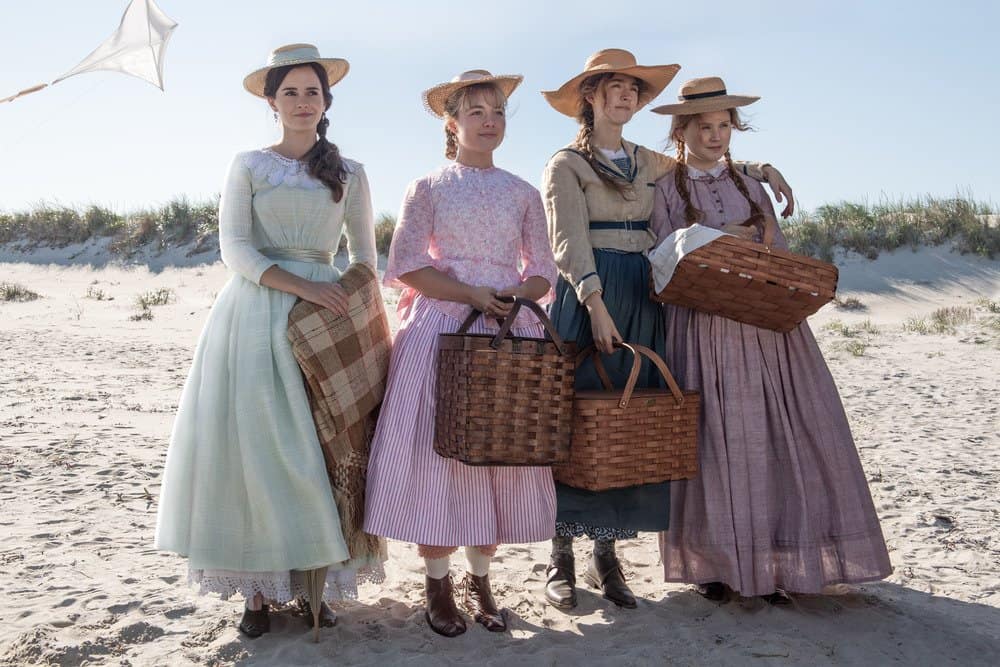Love. Betrayal. Forgiveness. Death. These themes occur in Greta Gerwig’s recent adaptation of Louisa May Alcott’s Little Women.
Moving between past and present, Gerwig shows us the joys and struggles of four sisters as they navigate adolescence and adulthood. Raised by deeply religious and altruistic parents, Jo, Meg, Amy, and Beth develop their talents amidst the gritty realities of the Civil War, poverty, and a society where advancement for women seems limited to marrying well. While each of these limitations could serve as an area of extended reflection, I propose that it is worthwhile to focus on the kind of story that Little Women tells.
Ultimately, both Gerwig and Alcott claim that domestic life is worthy of being told.
In the character of Jo, an aspiring writer, we see the questions concerning the value of the domestic emerge. At the beginning of the movie, Jo meets with a publisher who tells her that in order to make her stories sell, she must depict her female protagonists as simple characters with short and “spicy” plotlines whose dramas revolve around love interests dueling and fighting on their behalf. Driven by the need for money to support herself, she sets aside her own ambitions to weave the complex inner and relational worlds of women. In submitting to the publisher’s request, however, Jo also distances herself from her creativity. She uses a pseudonym for the work and subsequently finds it impossible to write.
It is only the grief at losing her youngest sister that prompts Jo to pick up her pen. Her ink bleeds the dramas of domesticity taken from the pages of her own life. In talking about the manuscript with her sister Amy, she expresses doubts about getting her story published. She asks Amy, “Who will be interested in a story of domestic struggles and joys? It doesn’t have any real importance.” Amy wisely responds, “Perhaps writing will make them more important.”
This is the proposition at the heart of Little Women. We (individually and communally) construct narratives in our attempts to understand our place in relation to reality. In a world where the news cycle is dominated by the macro-problems of war, weather, impeachments, and other structural challenges, we can find ourselves dazed, unsure of how to respond. Yet, Little Women invites us to consider that, before any kind of technocratic solution, we focus on how others factor into our narrative.
Care ethicist Virginia Held warns us that we very often base our systems of ethics on abstract problems and large systems at the risk of ignoring the value of the particular and interdependent relationships that characterize human life. For instance, while we may use GDP as a metric of “success”, how we give value to the caring relationships between parents and children? How do we measure the worth of a teacher who takes a cut in pay and commutes several hours a day to teach religion at a Catholic grade school?
Perhaps we ignore the value of these particular relationships because we know the challenge and sacrifice that they entail. As Dostoyevsky wrote in Brothers Karamazov, “The more I love humanity, in general, the less I love the human being in particular”. When we really focus on particular relationships, we find places of both love and brokenness. Yet, rather than despair, it is in that space of vulnerability that we learn what it is to forgive, hope, and dream. We find love, not just for abstract humanity, but for you. And, when we have stronger communities, it seems that we are better able to tackle the systematic challenges that we face. Climate change matters to me because I care for you. Isn’t this the “revolution of tenderness” that Pope Francis repeatedly calls for?
We’ve just emerged from the Christmas season. We’ve spent time contemplating the world’s most famous domestic scene centered with the Christ child in his creche. Our faith tells us that Jesus, the human face of God, belonged to a family, had close relationships with the apostles and delighted in friends such as Lazarus, Martha, and Mary. We often talk about the hidden life of Christ, those details that the gospels don’t always capture but that we can imagine in a very Ignatian way.
Jesus knew what it was to work, to talk with friends over a meal, and to forgive others not just of their sins but for the slights and awkward moments that so often emerge between people who care for each other. Little Women reveals the gospel truth that it is through a relationship with and care for particular others that we make strides, as the late founder of L’Arche, Jean Vanier, would say, in the journey of becoming human.
—
Photo from IMDb, used under Fair Use Laws
Editor’s Note: This article was edited for clarity on January 24, 2019


